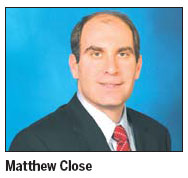Companies
US court ruling could impact SOEs
By Yang Cheng (China Daily)
Updated: 2010-07-27 10:50
 |
Large Medium Small |
Investment deals outside the country excluded from securities litigation
State-owned enterprises (SOEs) with investments or operations in the United States - or considering a public listing - are digesting a Supreme Court decision late last month that has potentially far-reaching implications.

The decision held that the main US law against securities fraud does not apply to investment deals that occur outside the country.
The ruling helps clarify securities litigation in the US, according to Matthew Close, a partner of the law firm O'Melveny & Myers in Los Angeles and a famous lawyer in the field of securities litigation nationwide in the US.
On June 24 the US Supreme Court delivered its landmark decision in the case of Morrison versus the National Australia Bank Ltd.
The ruling addresses the extraterritorial or transnational reach of the Securities Exchange Act of 1934, the principal statute used by plaintiffs to file securities class action lawsuits in the US, Close said.
In the Morrison case, three Australian plaintiffs who purchased shares of National Australia Bank (NAB) on the Australian Stock Exchange filed a class action lawsuit in New York against NAB and its US subsidiary, HomeSide Lending Inc.
The plaintiffs claimed that HomeSide manipulated its internal books and records and sent false financial data from the US to NAB's headquarters in Australia - allegedly false information that was incorporated into NAB's public filings in Australia.
Close noted that the case could trigger debate whether rules established in 1934 are still relevant today.
Insiders said revision of aging regulations has been part of recent heated discussion on US financial reform, which could include measures to protect cross-border investors.
He said published reports indicate some China SOEs choose to list outside the US to avoid securities class action litigation, especially after high-profile lawsuits were filed in New York against Chinese issuers.
Statistics show that 25 out of 284 US-listed Chinese companies have been involved in American lawsuits, including China's State-owned insurance giant China Life, whose legal travails lasted from 2004 to 2009. The protracted litigation damaged the company's performance and global image.
|
||||
Close said that the ruling leaves open the question of whether future legislation by Congress will extend the reach of federal securities laws.
"Because Morrison significantly affects the securities class action exposure for publicly listed companies throughout Asia and SOEs in China that are considering initial public offerings, it should also affect those companies' assessment of their insurance coverage needs and the anticipated costs of defending and settling securities litigation," he said.
'Adaptable to culture'
Close also pointed out that listing in the US has a number of advantages - it could indicate that the company has standard and strict internal controls and US listing offers the possibility of greater transactions and attracts more investors through the country.
Yet fear of lawsuit costs has deterred some SOEs from the US stock market. They have instead turned to Hong Kong, London or Singapore.
Li Qiang, a partner of O'Melveny & Myers in Shanghai, said that Chinese enterprises which now have strong ambitions to go overseas should develop their awareness and adapt to the US legal culture.
When considering listing in the US, they are urged to factor in their normal costs of compliance and potential lawsuits, information disclosure and stricter supervision.



